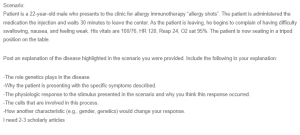Discussion – Anaphylaxis Following Allergy Immunotherapy
Anaphylaxis is a severe allergic reaction that can be potentially fatal and usually manifests itself immediately after exposure to an allergen or during allergy immunotherapy. In this particular case, the patient is likely to have anaphylaxis since other signs, such as difficulty in swallowing, vomiting, dizziness, and the tripod positioning, suggest acute respiratory embarrassment (Ring et al., 2021).
Role of Genetics in Anaphylaxis
There is clear evidence that genetic factors are essential for determining who is at greater risk for anaphylaxis. Those with first-degree relatives with allergies or asthma are particularly at risk owing to genetic susceptibility to high immune responses to allergens (Miguel & Eugenio, 2023). For instance, genetic differences in genes that influence the synthesis of immunoglobulin E (IgE), cytokines, and the human leukocyte antigen (HLA) make a person vulnerable to anaphylactic events.
Presentation of Specific Symptoms
The dysphagia, nausea, and weakness are typical signs of anaphylaxis that require immediate professional intervention. These are due to the liberation of histamines and other mediators like proteases from mast cells and basophils, resulting in smooth muscle contraction and increased blood vessel permeability. These mediators affect the following vital signs manifestation of the patient: hypotension (BP 100/76), tachycardia (HR 120), and mild tachypnea (Resp 24), which are attributed to the feeling of weakness and respiratory distress (Abbas et al., 2021).
Physiologic Response and Cells Involved
The physiological change is a severe and quick release of histamines, leukotrienes, and other inflammatory agents from mast cells and basophils once the IgE antibodies on these cells are attached to the allergen. This leads to the characteristics that have been observed, including vasodilation, capillary formation, and intracellular migration. Leakage and bronchoconstriction cause difficulty breathing and swallowing.
Impact of Gender on Response
Gender can influence the severity and presentation of anaphylaxis. Females may experience more severe reactions due to hormonal differences, especially during certain phases of the menstrual cycle. If the patient were female, the response to the immunotherapy might have been even more intense, necessitating closer monitoring and possibly more aggressive treatment (Gülen, 2023).
References
Abbas, M., Moussa, M., & Akel, H. (2021). Type I hypersensitivity reaction. PubMed; StatPearls Publishing. https://www.ncbi.nlm.nih.gov/books/NBK560561/
Gülen, T. (2023). A puzzling mast cell trilogy: Anaphylaxis, MCAS, and mastocytosis. Diagnostics, 13(21), 3307–3307. https://doi.org/10.3390/diagnostics13213307
Miguel, R., & Eugenio, S. (2023). Immunologic, genetic, and ecological interplay of factors involved in allergic diseases. Frontiers in Allergy, 4(47). https://doi.org/10.3389/falgy.2023.1215616
Ring, J., Beyer, K., Biedermann, T., Bircher, A., Fischer, M., Fuchs, T., Heller, A., Hoffmann, F., Huttegger, I., Jakob, T., Klimek, L., Kopp, M. V., Kugler, C., Lange, L., Pfaar, O., Rietschel, E., Rueff, F., Schnadt, S., Seifert, R., & Stöcker, B. (2021). Guideline (S2k) on acute therapy and management of anaphylaxis: 2021 update. Allergo Journal International, 46(47). https://doi.org/10.1007/s40629-020-00158-y
ORDER A PLAGIARISM-FREE PAPER HERE
We’ll write everything from scratch
Question
Scenario:
Patient is a 22-year-old male who presents to the clinic for allergy immunotherapy “allergy shots”. The patient is administered the medication the injection and waits 30 minutes to leave the center. As the patient is leaving, he begins to complain of having difficulty swallowing, nausea, and feeling weak. His vitals are 100/76, HR 120, Resp 24, O2 sat 95%. The patient is now seating in a tripod position on the table.

Discussion – Anaphylaxis Following Allergy Immunotherapy
Post an explanation of the disease highlighted in the scenario you were provided. Include the following in your explanation:
-The role genetics plays in the disease.
-Why the patient is presenting with the specific symptoms described.
-The physiologic response to the stimulus presented in the scenario and why you think this response occurred.
-The cells that are involved in this process.
-How another characteristic (e.g., gender, genetics) would change your response.
I need 2-3 scholarly articles

